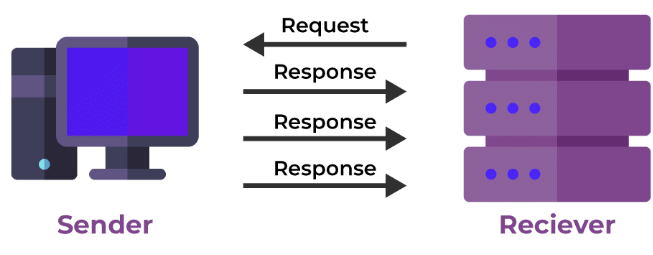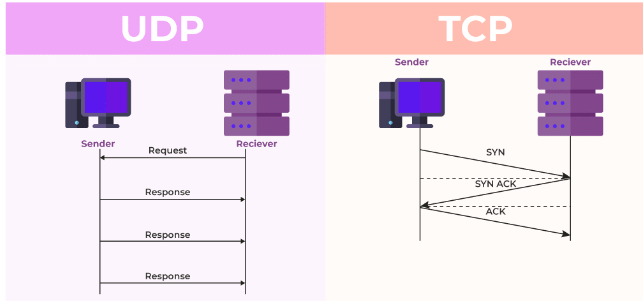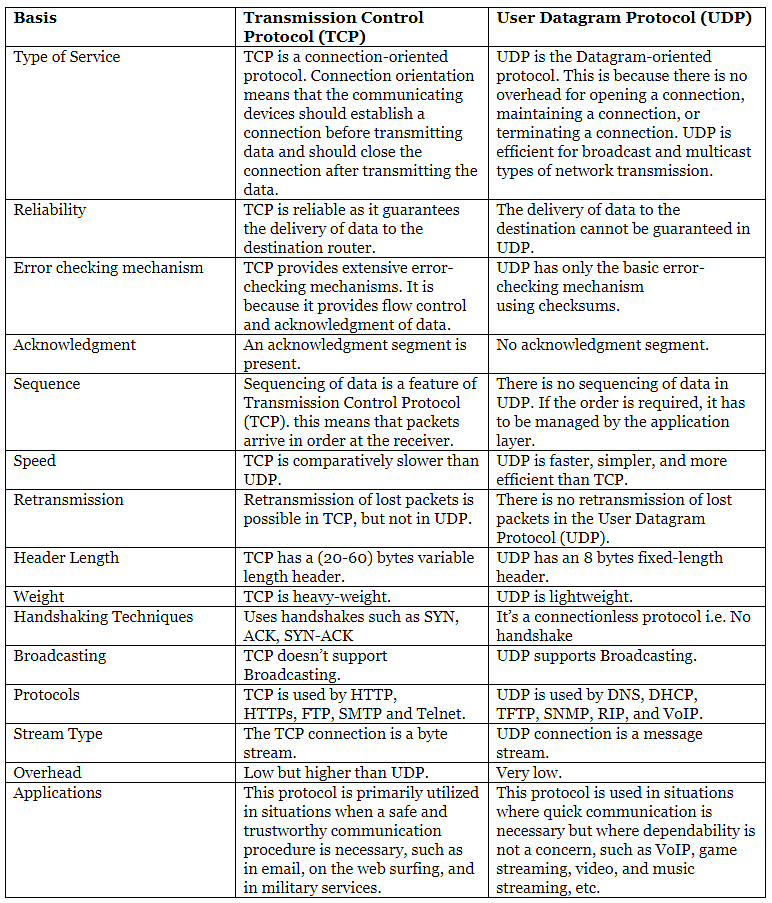Differences between TCP and UDP | Computer Networks - Computer Science Engineering (CSE) PDF Download
| Table of contents |

|
| What is Transmission Control Protocol (TCP)? |

|
| What is User Datagram Protocol (UDP)? |

|
| Which Protocol is Better: TCP or UDP? |

|
| Differences between TCP and UDP |

|
TCP and UDP are both Transport Layer protocols, but they differ significantly in their functions and applications. TCP is connection-oriented, whereas UDP is connectionless and part of the UDP/IP suite. This article explores the key differences between TCP and UDP.
What is Transmission Control Protocol (TCP)?
TCP (Transmission Control Protocol) is a fundamental protocol in the Internet protocol suite. Positioned between the Application and Network Layers, TCP provides reliable delivery services. It is a connection-oriented protocol that facilitates communication between devices over a network. TCP works in conjunction with the Internet Protocol (IP) to manage the transmission of data packets between computers.
 Transmission Control Protocol
Transmission Control Protocol
Features of TCP:
- Segment Tracking: TCP assigns numbers to each segment transmitted or received.
- Flow Control: Limits the rate of data transfer to ensure reliable delivery.
- Error Control: Implements mechanisms for error detection and correction.
- Congestion Control: Manages data flow based on network congestion levels.
Applications of TCP:
- World Wide Web (WWW): Ensures reliable data transfer between browsers and web servers.
- Email: Used by protocols like SMTP for email delivery.
- File Transfer Protocol (FTP): Ensures secure transfer of large files.
- Secure Shell (SSH): Provides encrypted communication for remote administration.
- Streaming Media: Used by services like Netflix and YouTube to manage data segments and retransmissions.
Advantages of TCP:
- Reliable connection between sender and receiver.
- Data is sent in a specific sequence.
- Independent of the operating system.
- Supports various routing protocols.
- Adjusts data transfer speed based on the receiver's capacity.
Disadvantages of TCP:
- Slower than UDP and consumes more bandwidth.
- Slower initial file transfer.
- Not suitable for LAN and PAN networks.
- Lacks multicast and broadcast capabilities.
- Cannot load a webpage if any data segment is missing.
What is User Datagram Protocol (UDP)?
User Datagram Protocol (UDP) is a Transport Layer protocol known for its connectionless and unreliable nature. It is part of the UDP/IP suite and does not require a connection before data transfer. UDP is designed for low-latency and loss-tolerant connections.
 User Datagram Protocol
User Datagram Protocol
Features of UDP:
- Simple Communication: Suitable for request-response communication with smaller data sizes.
- Multicasting: Supports packet switching for sending data to multiple recipients.
- Routing Protocols: Used by routing update protocols like RIP.
- Real-Time Applications: Ideal for applications that cannot tolerate uneven delays.
Applications of UDP:
- Real-Time Multimedia Streaming: Ensures smooth playback of audio and video content.
- Online Gaming: Facilitates fast communication between players.
- DNS Queries: Efficiently handles domain name lookups.
- Network Monitoring: Used by tools for rapid data exchange.
- Multicasting: Suitable for sending data to multiple recipients simultaneously.
- Routing Update Protocols: Utilized by protocols like RIP for exchanging routing information.
Advantages of UDP:
- No connection required for data transfer.
- Supports broadcast and multicast.
- Operates on a wide range of networks.
- Suitable for live and real-time data.
- Can deliver incomplete data.
Disadvantages of UDP:
- No acknowledgment of successful data transfer.
- Lacks mechanisms to track data sequence.
- Unreliable due to its connectionless nature.
- Packets are dropped by routers in case of collisions.
- Packets may be dropped if errors are detected.
Which Protocol is Better: TCP or UDP?
The choice between TCP and UDP depends on the specific requirements of the task. UDP is preferable for online gaming due to its low latency, while TCP is better for transferring data like photos and videos, ensuring accuracy and reliability. Both protocols have their advantages based on the context of their use.
 Difference Between TCP and UDP
Difference Between TCP and UDP
Where TCP is Used:
- Sending Emails
- Transferring Files
- Web Browsing
Where UDP is Used:
- Gaming
- Video Streaming
- Online Video Chats
Differences between TCP and UDP

Example: Consider two houses, H1 and H2, separated by a river, and a letter needs to be sent from H1 to H2.
Solution 1 (TCP): Build a bridge to deliver the letter. The connection ensures reliable delivery without loss or error.
Solution 2 (UDP): Use a pigeon to deliver the letter. The process is faster, but reliability is not guaranteed as the pigeon may face issues during delivery.
Conclusion
TCP and UDP are both crucial Transport Layer protocols with unique characteristics and uses. TCP ensures dependable, orderly, and error-free data transmission, making it ideal for tasks requiring precision, such as file transfers and web browsing. UDP offers faster, connectionless communication suitable for real-time applications like gaming and video streaming, where speed is essential and minor data loss is acceptable. The specific requirements of the task determine whether TCP or UDP should be used.
|
21 videos|113 docs|66 tests
|

|
Explore Courses for Computer Science Engineering (CSE) exam
|

|

















